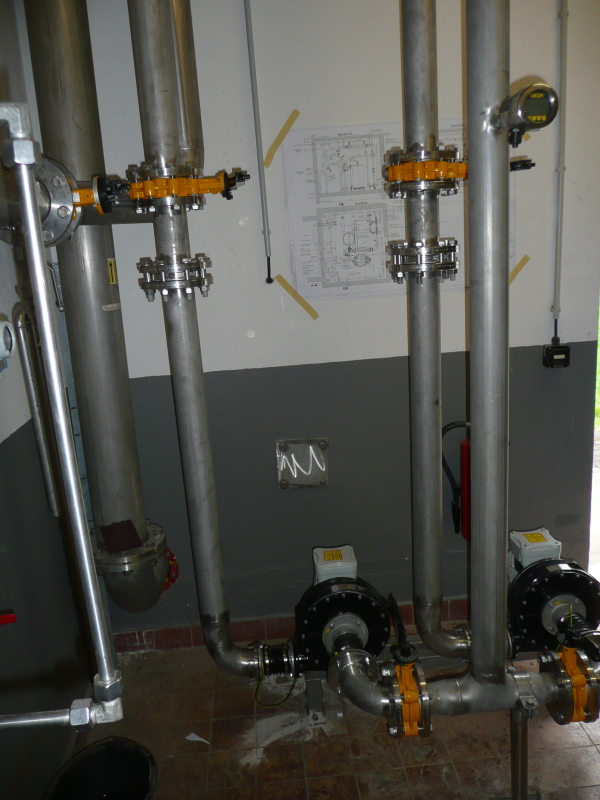The situation is this: At a current project, there's a pair of (parallel, redundant) radial blowers to raise the gas pressure for the downstream consumers (CHP, gas burner). All vibrating machinery should be isolated from the pipeline by compensators.
Now, the installed compensators leak. New, better (stainless steel vs. thin rubber) ones have been reordered but will take a few weeks. We need to commission other machinery that depends on the blowers. So the contractor suggested the following interim workaround: Weld pieces of pipe so that the blowers are connected without compensators, install the compensators in a few weeks when they arrive.
The problem is, everybody knows that machinery needs compensators, but nobody I've asked so far has seen a blower operate without. So no one knows for sure what the problems are, and how grave.
Here's my thoughts on possible risks:
The vibrations could damage welds
The vibrations could damage gaskets
I think both are unlikely. Nevertheless, here's the mitigation so far:
[ul]
[li] The blowers are equipped with variable frequency drives, ramp up will be done slowly to avoid startup-shakiness[/li]
[li] If there's massive vibration with the blowers running, we'll reconsider[/li]
[li] After the provisional pipeworks are done, and again after the compensators are installed, there will be a pressure test[/li]
[li] Further down the road, 10% of the welds will be X-rayed. I will make sure that many of those checks will cluster near the blowers[/li]
[li] I'm thinking about having someone check the gaskets of the flanged connections near the blowers with leak detection spray after every or every few operation days[/li]
[/ul]
My question is: Did I miss a risk that's not covered by the mitigation mentioned above?
Here's some more facts and considerations:
[ul]
[li] pipeline upstream and downstream is stainless steel with welded and flanged connections[/li]
[li] upstream and downstream, there's an arch after the compensator[/li]
[li] downstream, the pipe can move a few cm (not mounted to the wall or anything for 2m)[/li]
[li] upstream, the pipe is bolted to the floor shortly before the blowers[/li]
[li] We are talking relatively small radial blowers - 120Nm3/h @ 20mbar ΔP [/li]
[li] Max. pressure in the pipeline will be 40-50mbar over pressure [/li]
[li] The room this is happening in is Ex-Zone 1 or 2, all equipment (including the blowers) is Atex rated and there's a gas warning installed [/li]
[/ul]
Now, the installed compensators leak. New, better (stainless steel vs. thin rubber) ones have been reordered but will take a few weeks. We need to commission other machinery that depends on the blowers. So the contractor suggested the following interim workaround: Weld pieces of pipe so that the blowers are connected without compensators, install the compensators in a few weeks when they arrive.
The problem is, everybody knows that machinery needs compensators, but nobody I've asked so far has seen a blower operate without. So no one knows for sure what the problems are, and how grave.
Here's my thoughts on possible risks:
The vibrations could damage welds
The vibrations could damage gaskets
I think both are unlikely. Nevertheless, here's the mitigation so far:
[ul]
[li] The blowers are equipped with variable frequency drives, ramp up will be done slowly to avoid startup-shakiness[/li]
[li] If there's massive vibration with the blowers running, we'll reconsider[/li]
[li] After the provisional pipeworks are done, and again after the compensators are installed, there will be a pressure test[/li]
[li] Further down the road, 10% of the welds will be X-rayed. I will make sure that many of those checks will cluster near the blowers[/li]
[li] I'm thinking about having someone check the gaskets of the flanged connections near the blowers with leak detection spray after every or every few operation days[/li]
[/ul]
My question is: Did I miss a risk that's not covered by the mitigation mentioned above?
Here's some more facts and considerations:
[ul]
[li] pipeline upstream and downstream is stainless steel with welded and flanged connections[/li]
[li] upstream and downstream, there's an arch after the compensator[/li]
[li] downstream, the pipe can move a few cm (not mounted to the wall or anything for 2m)[/li]
[li] upstream, the pipe is bolted to the floor shortly before the blowers[/li]
[li] We are talking relatively small radial blowers - 120Nm3/h @ 20mbar ΔP [/li]
[li] Max. pressure in the pipeline will be 40-50mbar over pressure [/li]
[li] The room this is happening in is Ex-Zone 1 or 2, all equipment (including the blowers) is Atex rated and there's a gas warning installed [/li]
[/ul]

